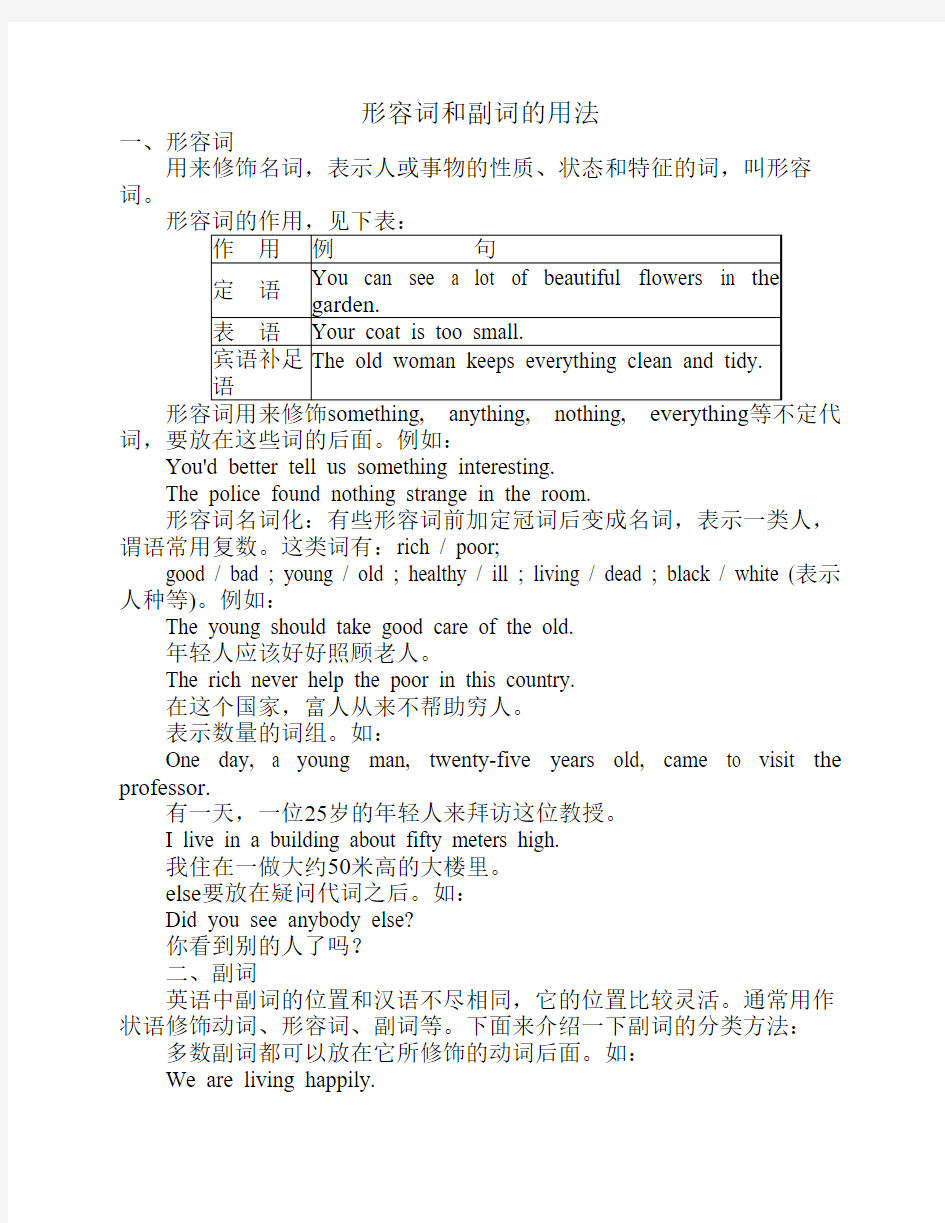
形容词和副词的用法
- 格式:pdf
- 大小:145.63 KB
- 文档页数:6


形容词和副词的用法
一、形容词
用来修饰名词,表示人或事物的性质、状态和特征的词,叫形容词。
形容词的作用,见下表:
作用例句
定语You can see a lot of beautiful flowers in the garden.
表语Your coat is too small.
宾语补足
语
The old woman keeps everything clean and tidy.
形容词用来修饰something, anything, nothing, everything等不定代词,要放在这些词的后面。例如:
You'd better tell us something interesting.
The police found nothing strange in the room.
形容词名词化:有些形容词前加定冠词后变成名词,表示一类人,谓语常用复数。这类词有:rich / poor;
good / bad ; young / old ; healthy / ill ; living / dead ; black / white (表示人种等)。例如:
The young should take good care of the old.
年轻人应该好好照顾老人。
The rich never help the poor in this country.
在这个国家,富人从来不帮助穷人。
表示数量的词组。如:
One day, a young man, twenty-five years old, came to visit the professor.
有一天,一位25岁的年轻人来拜访这位教授。
I live in a building about fifty meters high.
我住在一做大约50米高的大楼里。
else要放在疑问代词之后。如:
Did you see anybody else?
你看到别的人了吗?
二、副词
英语中副词的位置和汉语不尽相同,它的位置比较灵活。通常用作状语修饰动词、形容词、副词等。下面来介绍一下副词的分类方法:
多数副词都可以放在它所修饰的动词后面。如:
We are living happily.
我们幸福的生活着。
He runs slowly.
他跑的很慢。
时间副词、地点副词和方式副词一般放在句末。如:
They went to the park yesterday morning. 昨天上午他们去公园了。
I heard him sing English songs over there. 我听见他在那边唱英语歌曲。
He drove the jeep carefully. 他小心地开着吉普。
注意:有时表示时间的副词也可放在句首,起强调作用。如:Yesterday I got up late. 昨天我起床很晚。
频度副词usually, sometimes, always, often等词,一般放在be动词、情态动词之后,实义动词之前
如:He is seldom ill.
他很少生病。
You must always remember this.
你一定要记住这一点。
I often write to my parents.
我经常写信给父母。
注意:有时为了加强语气,频度副词也可放在句首。如:
Sometimes she goes to school by bus and sometimes she goes to school by bike.
有时她乘公共汽车上学,有时骑自行车去。
程度副词修饰动词,修饰形容词和副词时,放在它所修饰的词前面。如:
That's quite early.
那很早。
I nearly missed the bus.
我几乎错过了公交车。
She did rather badly.
她干得相当糟。
否定副词一般放在动词之前、系动词be或助动词之后。如:
She seldom goes out at night.
她晚上很少出门。
I am never late for school.
我上学从不迟到。
We had hardly got to the station when the train left.
火车离开时,我们差不多/几乎到了车站。
疑问副词放在特殊疑问句的句首。如:
When can you come?
你什么时候来?
What are you going to do when you grow up?
张大以后,你打算干什么?
同时存在时间状语和地点状语时,时间状语一般放在后面。如:
The meeting will be held in the classroom tomorrow.
明天会议将在教室里举行。
He watched TV in his room last night.
他作晚在房间里看电视。
They arrived in Beijing at 8 o'clock last evening.
他们昨天晚上8:00到达北京。
注:有些词既可用做形容词也可副词。如:
late, wide, well, fast, easy, early 等
三、形容词和副词的比较级和最高级
1.规则变化
单音节词和部分双音节词
(1)一般在词尾加er,est. hard---harder---hardest great---greater---greatest
(2)以字母e结尾的加r,st. nice---nicer----nicest able---abler----ablest
(3)重读闭音节中末尾只有一个辅音字母时,双写辅音字母,再加er,est.
big---bigger---biggest fat---fatter---fatter red---redder---reddest
thin---thinner---thinnest hot---hotter---hottest wet---wetter---wettest 多音节词和部分双音节词,在其前加more,most.
polite---more polite---most polite exciting---more exciting---most exciting interesting-more interesting-most imnteresting carefully--more carefully--most carefullyquickly--more quickly--most quickly happily--more happily--most happily
级
比较程度表达方式和意义例句备注
别
肯
Art is as interesting as